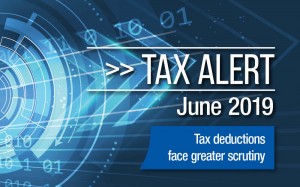Winter 2019
- 3 Jun 2019
- Michael Scott
- Financial Updates
The end of the election uncertainty and the investor-friendly policies of the Coalition produced a relief rally on financial markets. The Australian dollar bounced back above US69c on Monday after falling to three-year lows the day before the election, while local shares surged to an 11-year high on Monday before losing some of their gains the following day.
The Australian dollar more broadly has suffered from a flight to safety as trade tensions between the US and China escalate, pushing the US dollar higher. Global bond yields and share prices have also fallen in May.
In Australia, the Reserve Bank has trimmed its economic growth forecast for 2019 from 3.0 per cent to 2.75 per cent where it is expected to stay until at least June 2021, despite rising iron ore prices. This is against the background of a lift in the unemployment rate from 5.1 per cent to 5.2 per cent in April and a slide in business sentiment. The NAB business conditions index fell from 7.2 points to 3.1 points in April while the business confidence index remains below zero. New vehicle sales, a bellwether for consumer confidence, fell to their weakest level in 9 years in April, down 8.9 per cent over the year.
Now that the federal election is out of the way, all eyes will be on the Reserve Bank and whether it decides to cut the cash rate from its current level of 1.5 per cent to stimulate the economy.
Election 2019: A vote for continuity in an uncertain world
The Coalition is promising sweeping tax cuts for individuals and continuity for investors with no big changes to existing investment or superannuation policies.
One of the first items of business for Prime Minister Scott Morrison will be to reconvene Parliament to pass legislation on a low and middle-income tax offset.
Individuals to pay less tax
Providing the legislation is passed quickly, from 1 July Australians earning less than $37,000 will receive a tax offset of up to $255 (effectively a cash rebate) with their tax returns. If you earn between $48,000 and $90,000 you will get the maximum amount of $1080. The offset then scales down to zero for those earning $126,000 or more.i
Further planned tax cuts could depend on the Coalition winning the next federal election.
From July 2022, the Coalition plans to raise the top threshold of the 19 per cent income tax bracket to $45,000. Then from July 2024, it plans to reduce the 32.5 per cent tax bracket to 30 per cent and do away with the 37 per cent rate entirely.
If adopted, these proposals will result in a flat 30 per cent tax rate for anyone earning between $45,000 and $200,000.
Support for first home buyers
In a proposal that could also help stimulate the flagging residential property market, the Coalition has promised help for first home buyers trying to get a foot on the property ladder.
From January 2020, the proposed first Home Loan Deposit Scheme would allow eligible first home buyers with income of up to $125,000 (or $200,000 for a couple) to buy a home with a deposit as low as five per cent without incurring lenders mortgage insurance.ii
Help for small business
Small business has not been forgotten. As announced in the recent Budget, the popular instant asset write-off will be increased and extended to businesses with turnover of up to $50 million (previously $10 million).
Eligible businesses will be able to write off assets up to the value of $30,000 (previously $25,000) against their taxable income.
Investment tax concessions to stay
Investors can breathe easy now that controversial changes to dividend franking credits and negative gearing proposed by Labor will not go ahead.
Individuals, including those with a self-managed super fund, will continue to be entitled to a cash refund of franking credits attached to their share dividends if the franking credits exceed their tax liability.
Property investors have also earned a reprieve, with no changes to negative gearing rules.
Super changes at the margins
Australians hoping to boost their super in the run up to retirement will continue to enjoy existing tax concessions.
You will still be able to make catch-up concessional (pre-tax) contributions if you meet certain conditions. From the 2019-20 financial year, individuals who have not used their full $25,000 annual concessional contributions cap will be able to carry forward the shortfall for up to five years and claim a personal tax deduction. To be eligible, your total super balance must be below $500,000 on June 30 the previous financial year.iii
The non-concessional (after tax) contributions cap will remain at $100,000 a year for people with a total super balance below $1.6 million. Those under 65 can still bring forward up to three years’ contributions (or up to $300,000) with a proposal to increase the age limit to 67 from 1 July 2020.iv
The Coalition also plans to allow older Australians to make voluntary contributions until age 67 without meeting the work test. Subject to legislation, this measure would also begin on 1 July 2020.
Looking ahead
With the election out of the way, Australians can get back to the business of planning their finances with more certainty.
The initial response from financial markets was positive, with the Aussie dollar and local shares both up on the first day of trading after the election. However, the jury is still out on whether the Government’s tax cuts and spending promises will be enough to boost economic momentum.
If you would like to discuss your overall financial plan in the light of the election result, please give us a call.
i https://budget.gov.au/2019-20/content/tax.htm
ii https://www.liberal.org.au/latest-news/2019/05/12/helping-australians-buy-their-first-home
Tax Alert – June 2019
Tax deductions face greater scrutiny
With the end of the financial year only weeks away, the ATO has announced that one of its key areas of focus this financial year-end will be rental property, although returns from taxpayers using cryptocurrency assets are also expected to come in for close attention.
To help you prepare for this year’s tax time, here’s a roundup of some recent developments in the world of tax.
Watch your property deductions and income
Rental property owners are being warned to check their claims are correct before lodging their tax return, with the ATO announcing plans to double the number of audits it will be conducting on deductions linked to rental properties. Failing to declare income received from renting out a room in your home via an online platform like AirBnB is also a good way to get the tax man’s attention this year.
ATO sampling of tax returns last financial year found nine out of ten returns contained an error related to rental property deductions, so the regulator says it will be “looking very closely at claims this year”.i The ATO will be focussing on over-claimed interest, capital works claimed as repairs and incorrect apportionment of expenses for holiday homes, as well as taxpayers omitting income earned from accommodation sharing.
As part of the crackdown, the ATO is using sophisticated analytics and third party information from banks, rental bonds and online accommodation booking platforms to “scrutinise every tax return”. During an audit, the data searched could include your utility bills, tolls, social media and online content.
Cryptocurrencies under tax spotlight
Returns lodged by taxpayers using cryptocurrencies will also receive more attention, with the ATO currently collecting bulk records from Australian cryptocurrency designated service providers (DSPs) to include in its data-matching program.
Data being supplied by DSPs includes cryptocurrency purchase and sale information to enable the tax office to identify taxpayers failing to disclose their income details correctly. If you are one of the estimated 500,000 to one million Australians invested in crypto-assets, you can expect to have your tax return pre-filled with the relevant information by the ATO in the same way as bank interest.
Calls for standardised work-related deductions
With statistics showing total work-related expense deductions cost almost $22 billion in 2016-17, the Inspector-General of Taxation (IGT) has called for the introduction of a standard deduction for work-related expenses.i
The recommendation in the IGT’s Future of the Tax Profession report comes despite comments by the ATO that its efforts to target incorrectly reported or overclaimed work related expenses resulted in fewer claims in the past financial year.
According to the ATO, common mistakes are taxpayers assuming there is a standard work-related deduction they can claim of up to $300 without needing to substantiate it. Many taxpayers also assume that because up to 5,000 kilometres of car travel does not require a log book, they are entitled to claim this deduction.
Instant asset write-off rises again
The threshold for the instant asset write-off has risen again by $5,000 after the Treasurer announced the new annual limit of $30,000 with immediate effect from Budget night (2 April 2019). The immediate write-off has also been extended to include businesses with a turnover less than $50 million.
Eligible firms can claim a tax deduction on purchases of business equipment where the entire cost of the asset is less than the $30,000 threshold.
Although the instant asset write-off has been around since 2011 and has been extended until 30 June 2020, there is no guarantee it will be retained in future years. So if you have a small business and are interested in taking advantage of this benefit, it makes sense to keep this in mind come 30 June and next financial year.
Small business benchmarks updated
Small business owners interested in benchmarking their performance against similar businesses in the same industry have some new statistics they can use now the ATO has updated its business benchmark information with data from the 2016-17 financial year.
The Business Performance Check tool in the ATO app allows you to see how your business compares to your competitors using data from across more than 100 industries and 1.5 million small businesses in Australia.
Cruising through the finish line
– Tax tips for EOFY
The end of financial year can sometimes feel like a race to the finish. To help you cruise through the finish line come June 30, we’ve prepared a handy list of tips for both businesses and individuals.
Small business tips
Pay expenses, delay income
In most cases, it can be prudent to look for ways to bring forward tax-deductible expenses to the current financial year and delay income until July.
You may be able to pre-pay 12 months interest on a margin loan, or pre-pay 12 months premiums of income protection insurance held outside super, and claim the full deduction in this year’s return. You might also consider pre-paying membership fees for professional organisations and subscriptions for work-related publications.
Bad debts and obsolete stock
Think about writing off any bad debts in the business before June 30. You must have documentation to show you have made serious efforts to recover the debts which must have been previously included as assessable income.
Similarly, if you’ve got any inventory that you’re struggling to clear, it might be worth considering writing off or writing down obsolete stock.
Car expenses
When it comes to car expenses there are multiple ways to claim and calculations can be complex. It’s wise to get some advice on which method suits your company best.
Instant asset write-off
The threshold for the instant asset write-off has risen again by $5,000 and extended to include medium-sized businesses with turnover less than $50 million. Given that there have been a number of changes to the threshold, the amount you can claim will depend on when the asset was purchased or installed.
Relevant thresholds for the year:
| Threshold | Dates applicable |
| $30,000 | 7.30pm (AEDT) 2 April 2019 – 30 June 2020 |
| $25,000 | 29 January 2019 – 7.30pm (AEDT) 2 April 2019 |
| $20,000 | Before 29 January 2019 |
Superannuation
Superannuation is another area to consider at the end of the financial year, both for you and your employees. While employees’ super guarantee contributions don’t need to be paid until July 28, it makes sense to pay them by June 30 so you can claim the tax deductions in the current year.
Personal EOFY tips
Topping up your super
Topping up your super before June 30 can be tax effective and assist you towards a more comfortable retirement. There are many ways to do this such as personal deductible contributions, salary sacrificing, or spousal contributions. If you are struggling to meet the $25,000 cap, as of July 1, you will be able to carry forward any unused cap amount for up to five years if you have less than $500,000 in super. Talk to us about which strategy will work best for you.
Review your investment portfolio
After a mixed year on global share markets, you may be sitting on paper losses on some of your stocks. This could be a good time to sell some of your poor performers to offset against capital gains made on the sale of other investments over the past 12 months. Look to sell investments held for at least 12 months if you want to take advantage of the 50 per cent capital gains tax discount, while also taking into account your longer-term investment goals.
Claiming relevant deductions
Work related expenses – You’re entitled to claim deductions for certain work expenses, most of which are directly related to earning your income such as tools, uniform and travel expenses.
Rental property – You can claim an immediate deduction for interest on your investment loan, maintenance and tenancy costs such as the preparation of a lease or eviction. Some expenses are also claimable over a number of years, such as the cost of depreciating assets, structural improvements and borrowing expenses such as stamp duty and loan fees.
Tax time doesn’t have to be a hassle if you get prepared early. Both business owners and individuals should start getting their books in order now to make the most of any concessions before the June 30 cut-off. And remember, we’re always here to help to make reaching the EOFY finish line a walk in the park.




